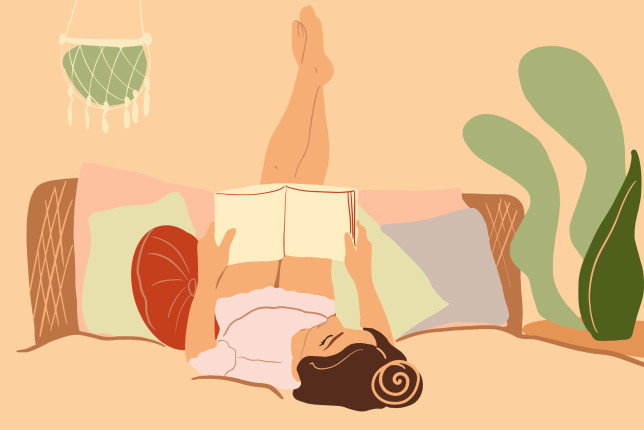Metro
How To Achieve Peace Of Mind In Pandemic

What does ‘peace of mind’ mean to you? Is it knowing that your family are safe?Or is it something you only achieve with meditation? Generally defined as a mental state that is free from worry and anxiety, peace of mind may have felt like an elusive concept since the dawn of the pandemic.
Some think peace of mind is an acquired skill – which requires time, practice and perseverance to develop – while others feel it’s about quietening the daily clutter inside our head with breathing techniques. Whatever your thoughts, the global upheaval that Covid-19 has brought with it has prevented lots of us from finding inner peace recently
A recent study by Public Health England, as part of its Every Mind Matters campaign, revealed that nearly half of adults (48%) are more worried during lockdown 3.0 than they were back in March 2020. Of those surveyed, lots of people say they had experienced more anxiety (46%), stress (44%), sleep problems (34%) and low mood (46%) over the course of the pandemic.
However, 60% say they feel hopeful about the future, so how can we shift our thought pattern into a more positive mindset? ‘Peace of mind is both a short-term and long-term goal,’ explains Raymond Tannor, who has a degree in psychology and is the founder of the Peace Of No Mind podcast. ‘Short-term you can achieve it by getting lost in meditation or something instantly rewarding.
Longer-term, it’s about meeting a basic need to feel secure and sheltered. ‘What often causes a lack of peace is when we shift between these two states.
Flitting between both can feel as though you are not achieving either. It’s better to focus on one or the other. Find that peace and live in the moment or think about long-term goals and create a life to help you reach those.’
After the year we have all had, finding peace of mind has never been more important. ‘The extended periods of isolation have massively affected our mental state, which leads to feelings of helplessness,’ he says. ‘I would argue that people may have always struggled to achieve peace of mind, however, they were able to use the world as a distraction.
READ ALSO: Engineer Wins Polaris Bank Million Naira In Ongoing Save & Win Promo
‘Lockdown has meant that people have spent a lot of time with their thoughts and it has made people more aware of their internal state and how they feel about their position in the world.’
Raymond’s podcast launched in 2019 and has recently interviewed guests including TV personality Vicky Pattison and actor Noel Clarke to find out what peace of mind means to them and how it’s best achieved. The podcast touches on mental health and navigating the world while overcoming adversity.
‘It’s an open-question format allowing individuals to interpret peace of mind the best way they can, giving a platform to voices who may not otherwise engage,’ he says. ‘When it comes to poor mental health, we tend to feel isolated and alone when we believe we are the only one experiencing it.
‘Hearing how other individuals have managed to find peace of mind shows us that they too have experienced turmoil and reminds us we can find that inner peace.’ Raymond’s top tips for helping to create peace of mind… Organise your thoughts ‘Write them out so you are able to see what needs your attention, what needs to be resolved and what can wait. It also brings an element of tangibility as you are able to isolate repetitive thoughts that are overcrowding your mental space.’
Tidy your living/working space ‘They say that your house or room is a reflection of your mental state. A rejig, clean or declutter can add a new energy and aid in calming the mind.’
Frame your perspective ‘Hone in on the small things you are grateful for. Research suggests that gratitude is consistently associated with greater happiness. Your outlook is a huge factor in how you interact with the world and view the external events that happen to you.’ Find time to connect ‘Try activities and skills that fuel you and do not leave you feeling depleted – whether that is zoning out to read, playing a video game or practising the cello. Identifying tasks and people that drain you is just as important, so limit engagement with them.’
Sit still ‘Whether that’s using an app like Headspace, meditating or focusing on breathing exercises, taking a few minutes to centre yourself is key.’ Laugh ‘In testing times, it may be hard to find reasons to smile, but evidence suggests that laughter strengthens your immune system and protects you from the damaging effects of stress.
Calling a friend who is guaranteed to make you smile or watching a comedy can help alleviate tension.’ Connect with green spaces ‘I find walking a different route to a familiar destination with my favourite podcast allows me to get lost in the journey as I move in a flow-like state.’
Help someone in need ‘Although we may not believe we have a lot to offer, there are so many ways we can support each other and evidence suggests it can promote physiological changes in the brain linked with happiness. We can offer support through monetary means, a skill set or even an open ear.’
Send Us A Press Statement Advertise With Us Contact Us
And For More Nigerian News Visit GWG.NG


